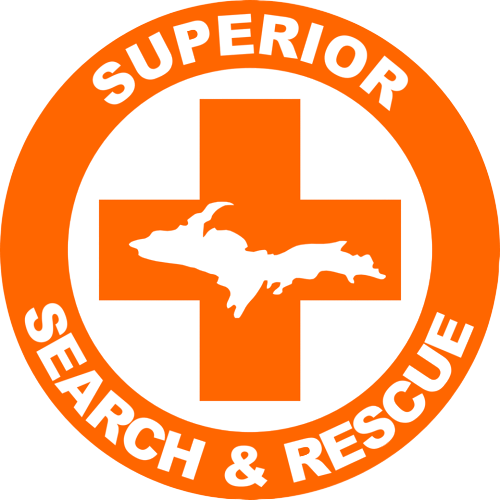Basic Training
Welcome to the Superior SAR training resource page!
Learning to the mind, is what a whetstone is to a blade. Keep your mind sharp and it will not fail you when you need it most. Below you will find learning resources which are not only fundamental to Search and Rescue operations, but will help any outdoor enthusiast avoid fatal mistakes. Once you have completed a course, email any certificates to your Training Officer.
It is recommended that training be completed in the following order to build a solid foundation of SAR knowledge:
Step 1 - Complete Phase I and II SAR Skills Training and review how to build a 24hr Ready Pack
Step 2 - Complete Bloodborne Pathogens and HAZWOPER Training
Step 3 - Complete IS 100, IS 200, IS 700, IS 800, A 100 and Phase III SAR Skills Training
Links to all the necessary training can be found bellow.
There are additional training for position specific roles on the team. These are Awareness Level Courses that are met to supplemental to training for those roles.
“Next to creating a life, the finest thing a man can do is save one.”
—Abraham Lincoln
-
Phase I SAR Skills Training (12.5 hrs)
Online training which builds the foundation for a successful SAR volunteer. Topics include: Physiology and Fitness, Safety in SAR environments, Planning Ahead, Clothing, Foot Travel, Survival and Improvisation and Navigation Skills.
At the end of each topic is a short quiz that must be completed for credit.
-
Build a 24/48hr Ready Pack
No one ever knows how long a SAR operation will last, and it is important to be prepared. Having the right tools at the right time will help lead to success, and a packing list has been provided to help with deciding what goes into a 24hr Ready Pack. Keep in mind, these are suggestions. Only pack the items you know how to use, and have tested in a field environment.
-
Phase II SAR Skills Training
Online training that continues to build off of the foundation training of Phase I. Current topics include: Search and Tracking Techniques, and De-escalation Techniques.
(Future Topics Coming Soon: Rescue and Recovery, Low-Mountain Interface Training, and Volunteer Management)
-
Bloodborne Pathogens Safety Training (0.5 hrs)
Bloodborne Pathogens Safety Training is a quick way to become familiarized with the hazards present when working near human fluids, such as blood, urine or mucus.
After reviewing the video, please take the short quiz bellow.
Watch the video here.
-
HAZMAT Awareness
Because of the nature of SAR, volunteers may find themselves in situations where hazardous chemicals and waste are present. This short video will familiarize volunteers with ways to identify hazardous materials, and important measures to take when confronted with those types of scenarios.
Upon Completion email the course certificate to the SSAR Training Officer
Please use Superior Search & Rescue as the sponsor organization, Local Government, Search & Rescue. 403 E. Houghton Ave, Houghton, MI 49931
If you need help please contact the President, Recommended to use Firefox, Google will not work for this class.
Hazmat Awareness Training - First Time
Hazmat Awareness Refresher - Refresher
-
IS 100: Intro to ICS (2 hrs)
This course is to help a SAR volunteer understand what goes on during an incident, and where they fit in to the big picture.
Introduction to the Incident Command System, introduces the Incident Command System (ICS) and provides the foundation for higher level ICS training. This course describes the history, features and principles, and organizational structure of the Incident Command System. It also explains the relationship between ICS and the National Incident Management System (NIMS).
-
IS 200: Basic ICS for Initial Response (4 hrs)
Occasionally leaders are made by necessity instead of by choice. This course will help SAR volunteers better understand their role if they were required to step into a temporary supervisory position.
Basic Incident Command System for Initial Response, reviews the Incident Command System (ICS), provides the context for ICS within initial response, and supports higher level ICS training. This course provides training on, and resources for, personnel who are likely to assume a supervisory position within ICS.
-
IS 700: National Incident Management System (3.5 hrs)
SAR volunteers are often asked to help during large scale community emergency situations, such as fires and floods. This course will help volunteers see how ICS is implemented on a community wide level.
This course provides an overview of the National Incident Management System (NIMS). The National Incident Management System defines the comprehensive approach guiding the whole community - all levels of government, nongovernmental organizations (NGO), and the private sector - to work together seamlessly to prevent, protect against, mitigate, respond to, and recover from the effects of incidents. The course provides learners with a basic understanding of NIMS concepts, principles, and components.
-
IS 800: National Response Framework (3 hrs)
This course is for further understanding of how ICS is implemented on a community wide level.
The goal of the IS-0800.d, National Response Framework, An Introduction, is to provide guidance for the whole community. Within this broad audience, the National Response Framework focuses especially on those who are involved in delivering and applying the response core capabilities.
-
Phase III SAR Skills Training
Online training which covers intermediate SAR skills. Topics include: Advanced Tracking Techniques, Incorporating Assets, and Multi-Agency Considerations.
At the end of each topic is a short quiz that must be completed for credit.
-
Baby Its Cold Outside
Welcome to Baby It's Cold Outside, an awareness and educational program about hypothermia and cold injuries developed specifically for you, the professional Search and Rescue Responder! It's been created to provide the information necessary to properly handle subjects with cold injuries, including hypothermia.
-
Position Specific Training
To be a part of specific teams you will need to take Awareness Level and In-person training for certain roles on the team.
You can find those roles and training here.
